Codependency: Symptoms & Treatment
Most people want to feel needed by the ones they care about. Men and women who are codependent take this to an extreme. They devote time, effort, and emotional energy to a one-sided relationship trying to meet the needs of someone who is incapable of appreciating them. The term codependency has been around for almost four decades. “Codependent” originally was a term that applied to the spouse of an alcoholic. While it still is commonly used to describe a person’s relationship with someone who is dependent on alcohol or drugs, it also applies more broadly to any relationship in which someone—a spouse, partner, friend, sibling, parent, or coworker, for example—focuses on taking care of another person’s needs at the expense of their own. Codependency symptoms and treatment can be different depending on many reasons.

Do you know someone who needs approval from others to feel good about themselves? Do they fall apart when someone offers constructive criticism? If you answered yes at least once, the person you are thinking about may have codependent tendencies. The good news is that codependency is treatable at such mental health treatment centers as Overland IOP in Los Angeles, California.
Let’s explore what codependency is, what symptoms of codependency are, and how to overcome it.
What is Codependency?
According to Mental Health America, codependency is often referred to as “relationship addiction,” in that codependent people tend to form and become dependent on unhealthy, emotionally harmful relationships. Codependency is defined as a dysfunctional relationship in which one or both people enable the destructive behavior of their partner or loved one. Codependency is considered a learned behavior and can typically begin during the childhood years. You may have watched a parent or loved one in a codependent relationship in which they were excessively reliant on another person for stability and overall well-being and now believe that excessive dependence on another individual for your own well-being constitutes love and affection. Or you may have experienced a traumatic event in which you felt unsafe and you began to cling to others for a sense of security and even though the trauma has passed, you continue to seek that security in another person. At its most basic a codependent relationship involves one person who needs security from their partner and their partner needs to be needed.
Because these needs work in tandem, individuals in codependent relationships will do whatever it takes to maintain the relationship, even if it means turning a blind eye to addiction, mental or physical abuse, and behaviors and decisions that can cause damage to property, finances, and the lives of others. You may be in a codependent relationship if your self-esteem and self-worth are tied to your partner or loved one or you alone are responsible for making them happy.
According to a 2018 research review – click to download PDF, patterns of codependent behavior generally involve four main themes:
- self-sacrifice
- a tendency to focus on others
- a need for control, which may fuel conflict
- difficulty recognizing and expressing emotions
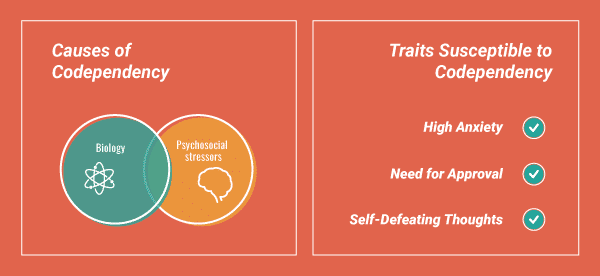
Factors Contributing to Codependency
The root cause of codependency can be attributed to a combination of factors, as explained by Dr. Mark Mayfield, a licensed professional counselor (LPC). He emphasizes that a poor concept of self and weak boundaries lie at the foundation of codependency, often accompanied by an inability to express personal opinions or assert boundaries effectively.
Research indicates that codependency may stem from biological, psychological, and social elements that interact to shape an individual’s predisposition to codependent behaviors.
Biological Factors: Brain Responses and Empathy
Biologically, codependency may be influenced by the functioning of the prefrontal cortex in the brain. In codependent individuals, this part of the brain may struggle to suppress empathic responses, resulting in an excessive amount of empathy. This heightened empathic capacity can make it easier for individuals to become codependent in their relationships.
Psychological Factors: Caretaker Disposition and Life Experiences
Psychological predispositions and life experiences play a significant role in codependency. Some individuals may have an inherent inclination to prioritize the care of others, making them more susceptible to developing codependent patterns. Negative life experiences, such as growing up in an environment with frequent parental conflicts or experiencing neglect or emotional abuse, can also contribute to the development of codependency.
Social Factors: Changing Roles and Substance Abuse
Social dynamics and cultural shifts can impact the prevalence of codependency. Changes in societal views regarding gender roles, particularly with regards to women’s roles, can influence the development of codependent behaviors. Additionally, exposure to substance abuse within family units can contribute to the emergence of codependency as individuals navigate challenging dynamics and attempt to support their loved ones.
It is important to recognize that codependency can manifest in various forms and degrees of severity. Dr. Mayfield highlights that codependency can emerge in different types of relationships, including parent-child, partner-partner, spouse-spouse, and even coworker-boss dynamics.
By understanding the multifaceted nature of codependency and its underlying causes, individuals can begin to identify and address the factors contributing to their codependent patterns. This knowledge opens the door to personal growth, healthier boundaries, and the cultivation of more balanced and fulfilling relationships.
Codependency: Symptoms
Do you know someone who needs approval from others to feel good about themselves? Do they fall apart when someone offers constructive criticism? If you answered yes at least once, the person you are thinking about may have codependent tendencies. The good news is that codependency is treatable at such mental health treatment centers as Overland IOP in Los Angeles, California. Let’s explore what it is, what causes it, and how to overcome codependency.
Codependency symptoms can look different depending on the relationship, but there are several core symptoms which include:
- An exaggerated sense of responsibility for the actions of others
- A tendency to confuse love and pity, with the tendency to “love” people they can pity and rescue
- A tendency to do more than their share, all of the time
- A tendency to become hurt when people don’t recognize their efforts
- An unhealthy dependence on relationships. The co-dependent will do anything to hold on to a relationship; to avoid the feeling of abandonment
- An extreme need for approval and recognition
- A sense of guilt when asserting themselves
- A compelling need to control others
- Lack of trust in self and/or others
- Fear of being abandoned or alone
- Difficulty identifying feelings
- Rigidity/difficulty adjusting to change
- Problems with intimacy/boundaries
- Chronic anger
- Lying/dishonesty
- Poor communications
- Difficulty making decisions
The problem is that these repeated rescue attempts allow the needy individual to continue on a destructive course and to become even more dependent on the unhealthy caretaking of the “benefactor.” As this reliance increases, the co-dependent develops a sense of reward and satisfaction from “being needed.” When the caretaking becomes compulsive, the co-dependent feels choiceless and helpless in the relationship but is unable to break away from the cycle of behavior that causes it. Co-dependents view themselves as victims and are attracted to that same weakness in love and friendship relationships.
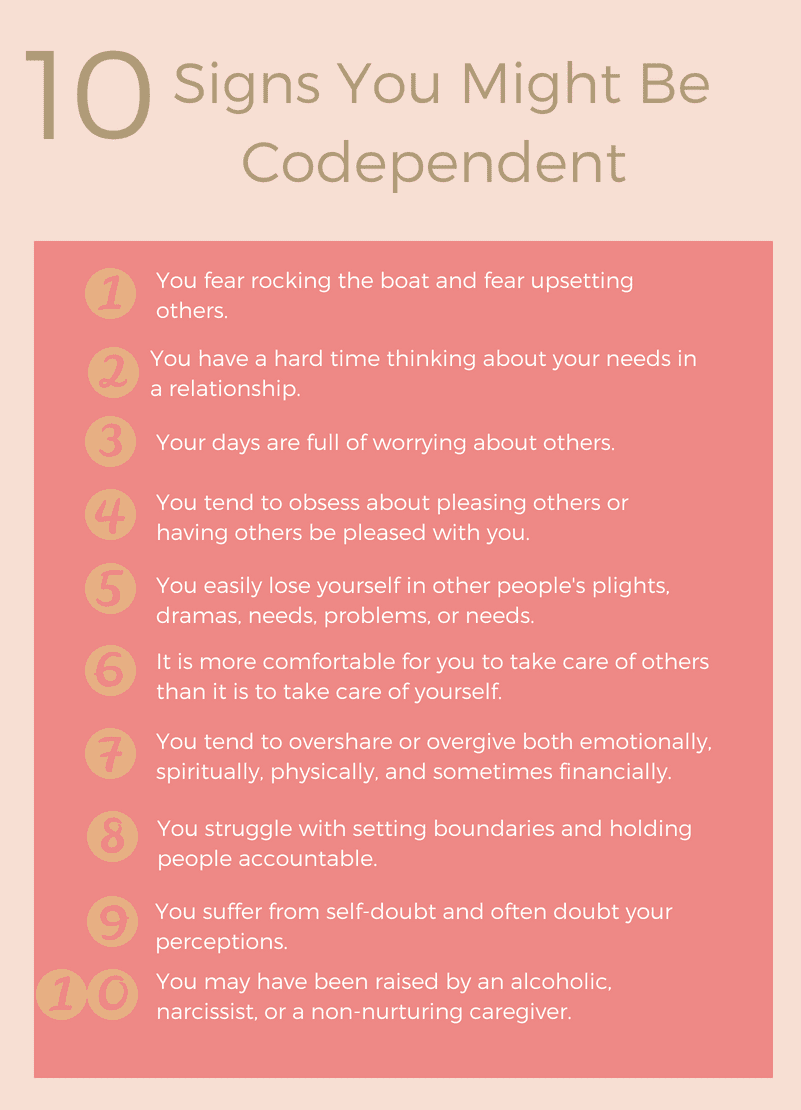
Codependency: Treatment
Treatment for codependent relationships generally involves individual therapy for both partners involved, as well as couples therapy. If addiction to drugs and/or alcohol is a factor in the relationship, the partner with the addiction will be encouraged to engage in treatment for that as well. Individual therapy for Codependency involves a focus on self-esteem, self-efficacy, and relinquishment of dependence on others in regard to self-worth. Therapy engagement will also focus on the establishment of boundaries and how to say no.
It’s important to note that some relationships do not last once the factor of codependence is removed from the situation even with therapy. However, with new tools and behaviors, individuals who have engaged in therapy can combat negative thoughts and feelings of self-doubt when they emerge and avoid relying on prior codependent behaviors when negative situations arise.
The decision to seek treatment for a codependent relationship is not easy. It can be scary to think about changing your behavior and starting a new relationship relying solely on yourself. Thankfully there are resources out there to assist in the transition and healing. Are you or a loved one ready to seek help for a codependent relationship? If so, please contact us today. Our caring and compassionate staff are available 24/7. Overland Intensive Outpatient is ready to provide both in-person and virtual care (telehealth services)
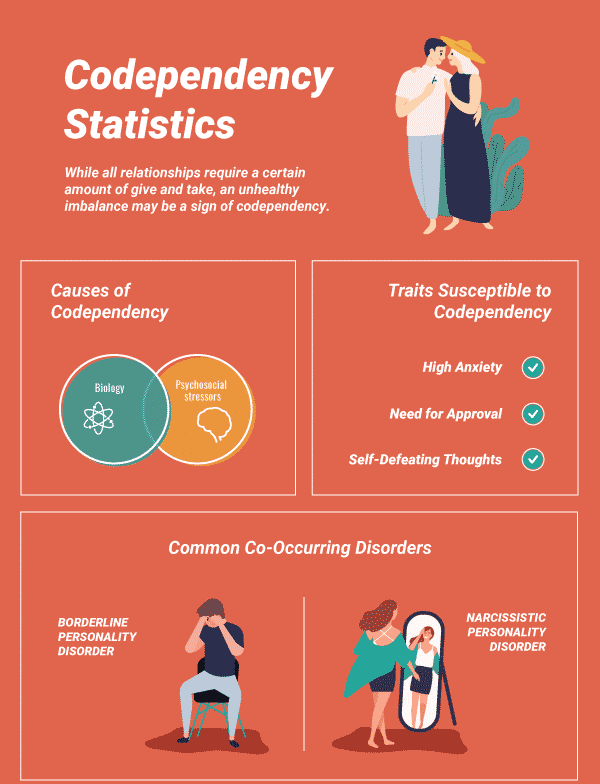
What Is A Dysfunctional Family And How Does It Lead To Co-Dependency?
A dysfunctional family is one in which members suffer from fear, anger, pain, or shame that is ignored or denied. Underlying problems may include any of the following:
- An addiction by a family member to drugs, alcohol, relationships, work, food, sex, or gambling.
- The existence of physical, emotional, or sexual abuse.
- The presence of a family member suffering from a chronic mental or physical illness.
Dysfunctional families do not acknowledge that problems exist. They don’t talk about them or confront them. As a result, family members learn to repress emotions and disregard their own needs. They become “survivors.” They develop behaviors that help them deny, ignore, or avoid difficult emotions. They detach themselves. They don’t talk. They don’t touch. They don’t confront. They don’t feel. They don’t trust. The identity and emotional development of the members of a dysfunctional family are often inhibited
Attention and energy focus on the family member who is ill or addicted. The co-dependent person typically sacrifices his or her needs to take care of a person who is sick. When co-dependents place other people’s health, welfare and safety before their own, they can lose contact with their own needs, desires, and sense of self.
How Do Co-dependent People Behave?
Co-dependents have low self-esteem and look for anything outside of themselves to make them feel better. They find it hard to “be themselves.” Some try to feel better through alcohol, drugs or nicotine – and become addicted. Others may develop compulsive behaviors like workaholism, gambling, or indiscriminate sexual activity.
They have good intentions. They try to take care of a person who is experiencing difficulty, but the caretaking becomes compulsive and defeating. Co-dependents often take on a martyr’s role and become “benefactors” to an individual in need. A wife may cover for her alcoholic husband; a mother may make excuses for a truant child, or a father may “pull some strings” to keep his child from suffering the consequences of delinquent behavior.
Signs of codependency include:
- Difficulty making decisions in a relationship
- Difficulty identifying your feelings
- Difficulty communicating in a relationship
- Valuing the approval of others more than valuing yourself
- Lacking trust in yourself and having poor self-esteem
- Having fears of abandonment or an obsessive need for approval
- Having an unhealthy dependence on relationships, even at your own cost
- Having an exaggerated sense of responsibility for the actions of others
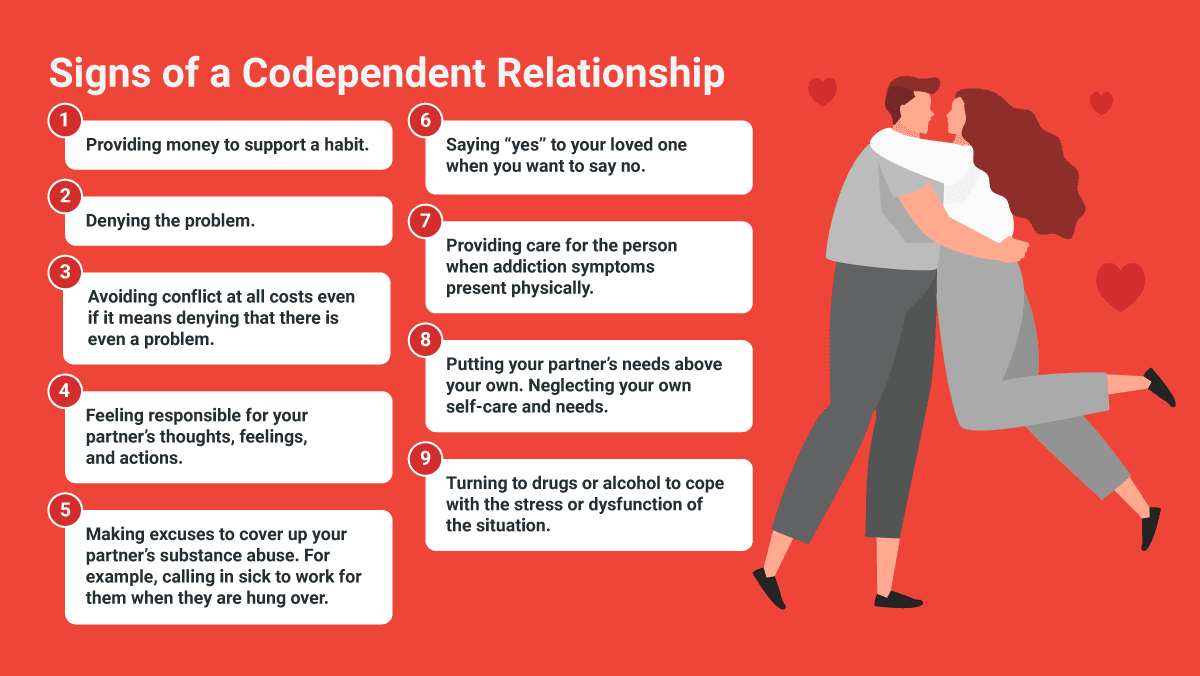
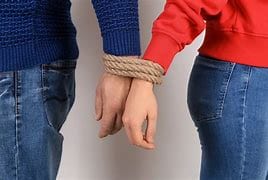
Codependency and Addiction
Codependency and addiction are often co-occurring struggles. In fact, the first studies involving Codependency were focused on the codependent relationship between alcoholics and their spouses. Many times a partner or loved one in the codependent relationship will struggle with an addiction to drugs and/or alcohol and their partner will enable their behavior and make excuses for them to keep them happy and prevent others from knowing the addiction exists.
In other cases, the codependent partner will not only enable their partners’ addiction and help to hide it from others but they will also aid in their destructive behavior, whether that means providing money for drugs and/or alcohol or actively purchasing the materials for them. This behavior feeds the needs of both people involved in the codependent relationship by providing the addict with the tools for their addiction and allowing the codependent partner to feel as though they have helped to keep their partner safe and secure.


The decision to seek treatment for a codependent relationship is not easy. It can be scary to think about changing your behavior and starting a new relationship relying solely on yourself. Thankfully there are resources out there to assist in the transition and healing. Are you or a loved one ready to seek help for a codependent relationship? If so, please contact us today. Our caring and compassionate staff are available 24/7. Overland Intensive Outpatient is ready to provide both in-person and virtual care (telehealth services)/
Published: January 29, 2021

Published: February 14, 2026
Medication-Assisted Treatment (MAT): How It Works?
Summary: Medication-assisted treatment (MAT) is an evidence-based approach to addiction treatment that combines FDA-approved medications with behavioral therapy and counseling to treat substance use disorders — primarily opioid and alcohol addiction. MAT is endorsed by the Substance Abuse and Mental Health Services Administration (SAMHSA), the National Institute on Drug Abuse (NIDA), and the World Health […]
Read more
Published: February 06, 2026
Talk Therapy: Types, Benefits & How It Works in California
Summary: Talk therapy — also known as psychotherapy — is a structured, evidence-based treatment approach in which a trained mental health professional helps individuals identify, understand, and change the thoughts, emotions, and behaviors that contribute to mental health conditions and substance use disorders. It is the foundation of treatment for depression, anxiety, PTSD, personality disorders, […]
Read more
Published: January 27, 2026
What Is DPD? Understanding Dependent Personality Disorder
Most people don’t ask, “What is DPD or Dependent Personality Disorder?” They come in feeling drained, anxious, and stuck in relationships that feel restrictive yet hard to leave. Being alone feels unsettling. Decision-making feels paralyzing. Reassurance becomes a daily necessity rather than a comfort. At Overland IOP in Los Angeles, we often see Dependent Personality […]
Read more
